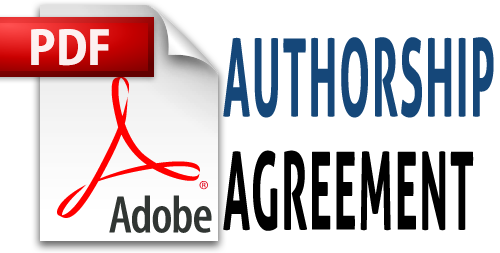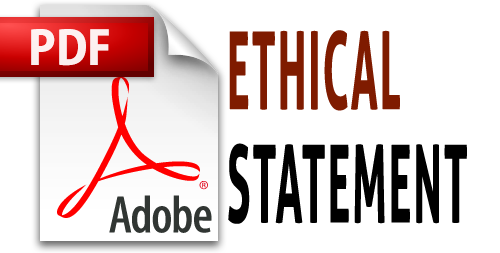REFLECTIVE MODUL BERBASIS CHILD FRIENDLY SCHOOL UNTUK MENINGKATKAN KEMAMPUAN LITERASI DAN KARAKTER SISWA
 Santy Dinar Permata(1*),
Ali Mustadi(2)
Santy Dinar Permata(1*),
Ali Mustadi(2)
(1) Program Pascasarjana Universitas Negeri Yogyakarta
(2) Program Pascasarjana Universitas Negeri Yogyakarta
(*) Corresponding Author
 Abstract viewed : 3345
|
Abstract viewed : 3345
|  PDF downloaded : 341
PDF downloaded : 341
Abstract
Welcoming the Golden Generation 2045 program the Indonesian government envisions the literacy movement in schools as an effort to improve the literacy abilities and character of students. The problem in the field is the lack of types of student reading that are able to develop students 'thinking power and character, therefore this study aims to produce reflective module development products based on child friendly schools that are fit for use by fifth grade elementary school students in school literacy activities as a means of increasing students' literacy abilities and character. The type of research used is Research and Development (RnD) research, referring to the type of research developed by Borg and Gall. The subjects of the study were the fifth grade 73 students at SDN Tegalrejo 3 and SDN Bangirejo 1. Collecting data through interviews, observations, questionnaires and response scales. The analysis technique used is descriptive analysis. The results showed that the child friendly school-based reflective module products met the eligibility criteria by referring to the results of the questionnaire validation by media experts and material experts as well as the scale of responses of teachers and fifth grade elementary school students.
Abstrak
Menyongsong program Generasi Emas 2045 pemerintah Indonesia mencangangkan adanya gerakan literasi di sekolah sebagai upaya untuk meningkatkan kemampuan dan karakter siswa. Permasalahan dilapangan adalah kurangnya jenis bacaan siswa yang mampu mengembangkan daya pikir dan karakter siswa oleh karena itu penelitian ini bertujuan untuk menghasilkan produk pengembangan reflective modul berbasis child friendly school yang layak digunakan oleh siswa kelas V SD dalam kegiatan literasi sekolah sebagai sarana meningkatkan kemampuan literasi dan karakter siswa. Jenis penelitian yang digunakan adalah penelitian Research and Development (RnD) mengacu pada jenis penelitian yang dikembangkan oleh Borg and Gall. Subjek penelitian adalah 73 siswa kelas V SD di SDN Tegalrejo 3 dan SDN Bangirejo 1. Pengumpulan data melalui wawancara,observasi,angket dan skala respon. Teknik analisis yang digunakan adalah analisis deskriptif. Hasil penelitian menunjukkan bahwa produk reflective modul berbasis child friendly school memenuhi kriteria kelayakan dengan mengacu pada hasil validasi angket oleh ahli media dan ahli materi serta skala respon guru dan siswa kelas V SD.
Keywords
References
Abdulahmeed, M. I. (2013). The effectiveness of a proposed program based on integrated educational modul to develop sex education for kindergarden children. European Scientific Journal, 9(28), 283-296. https://eujournal.org/index.php/esj/article/view/1898
Ahmed, E. E., & Al-Khalili, K. Y. (2013). The Impact of Using Reflective Teaching Approach on Developing Teaching Skill of Primary Science Teacher. The Online Journal of New Horizons in Education, 58-64. https://www.tojned.net/journals/tojned/articles/v03i02/v03i02-07.pdf
Beers, C., Beers, J., & Smith, J. (2010). Literacy Instruction. New York London: The Gui Lford Press.
Bianchi, M. (2015). The Magic of Storytelling: How Curiosity and Aesthetic Preferences Work. Economics : The Open-Access, Open -Assessment E-Journal, 8(2014-44), 1-30.doi: 10.5018/economics-ejournal.ja.2014-44
Borg, W., Gall, J., & Gall, M. (2003). Educational Research. New York: Longman Inc.
Damanik, H., & Pakpahan, S. (2018). Pengembangan Bahan Ajar Tentang Sekolah Ramah Anak Pengembangan Bahan Ajar Tentang Sekolah Ramah Anak. Jurnal Keluarga Sehat Sejahtera, 16(1),1-13. https://doi.org/10.24114/jkss.v16i31.10172
Daryanto. (2013). Menyusun Modul (Bahan Ajar untuk Persiapan Guru dala Mengajar). Yogyakarta: Gava Media.
Depdiknas. (2008). Panduan Pengembangan Bahan Ajar. Departemen Pendidikan Nasional.
Dewey, J. (1933). How We Think : A Restatement of The Relation of Reflective Thinking to the Educative Process. Lexington,Massachusetts: D.C.Heath and Company.
Elmeski, M. (2011). Democratic Participation and Child-Friendly Schools. CFS Dimension Brief Democratic Participation, 1-7. http://miskewitt.com/assets/combined-file_5%2C6%2C7%2C8%2C9.pdf
Ersözlü , Z., & Arslan, M. (2009). The effect of developing reflective thinking on metacognitional awareness at primary education level in Turkey. Reflective Practice: International and Multidisciplinary Perspectives, 10(5), 683-695. https://doi.org/10.1080/14623940903290752
Genlott, A., & Grönlund , Å. (2013). Improving literacy skills through learning reading by writing: The iWTR method presented and tested. Computers&Education, 67, 98-104. https://doi.org/10.1016/j.compedu.2013.03.007
Gita, S. D., Annisa, M., & Nanna, A. I. (2018). Pengembangan Modul Ipa Materi Hubungan Makhluk Hidup Dan Lingkungannya Berbasis Pendekatan Kontekstual. Lensa (Lentera Sains): Jurnal Pendidikan IPA, 8(1), 28-37. http://jurnallensa.web.id/index.php/lensa/article/view/28.
Hieronymi, P. (2014). Reflection and Responsibility. Philosophy & Public Affairs, 42(1), 1-39. https://doi.org/10.1111/papa.12024
Irianto, D. M., Herlambang, Y. T., & Yunansah, H. (2018). Multiliteration Model Based On Ecopedagogy Approach in Improving Ecological Intelligence and Developing Characters. ICEE 2018 : International Conference on Elementary Education Universitas Pendidikan Indonesia. Bandung. http://proceedings.upi.edu/index.php/icee/article/view/30/27
Kao, G.-M., Tsai, C.-C., Liu, C.-Y., & Yang, C.-H. (2016). The effects of high/low interactive electronic storybook on elementary school students’ reading motivation, story comprehension and chromatics concepts. Computers & Education, 1-46. https://doi.org/10.1016/j.compedu.2016.04.013
Kelley, H., Cunningham, T., & Branscome, J. (2015). Reflective Journaling With At-Risk Students. Vistas Online, 1-9. https://www.counseling.org/docs/default-source/vistas/reflective-journaling-with-at-risk-students.pdf?sfvrsn=e2417f2c_8
Kementerian Pendidikan dan Kebudayaan. (2017). Materi Pendukung Literasi Sains. Jakarta: Kementerian Pendidikan dan Kebudayaan.
Kimianti,F.,Prasetyo,Z.K.,(2019).Pengembangan E-Modul IPA Berbasis Problem Based Learning Untuk Meningkatkan Literasi Sains Siswa.Kwangsan:Jurnal Teknologi Pendidikan Vol 07 No 02.91-103. http://doi.org/10.31800/jtp.kw.v7n2.p91--103
Kurniawati, Y., Permanasari, A., Muzakir, A., & Rohman, I. (2015). Potential of Reflective Thinking Skills as a Bridge for Students’ Prior-Knowledge and Chemistry Experiments Skills. International Journal of Science and Research (IJSR), 4(9), 216-221. https://www.ijsr.net/search_index_results_paperid.php?id=SUB157911
Lian, B., Kristiawan, M., & FItriya, R. (2018). Giving Creativity Room To Students Through The Friendly School's Program. International Journal Of Scientific & Technology Research, 7(7), 1-7. https://www.ijstr.org/final-print/july2018/Giving-Creativity-Room-To-Students-Through-The-Friendly-Schools-Program.pdf
Lickona, T. (2013). Pendidikan Karakter : Panduan Lengkap Mendidik Siswa Menjadi Pintar dan Baik (Terjemahan Lita S). Bandung: Nusa Media (Buku asli diterbitkan tahun 2008).
Maarof, N. (2007). Telling his or her story through reflective journals. International Education Journal, 8(1), 205-220. https://eric.ed.gov/?id=EJ841761
Majid, A. (2016). Perencanaan Pembelajaran Mengembangkan Standar Kompetensi Guru. Bandung: PT Remaja Rosdakarya.
Mansyur, Rasyid, H., & Suratno. (2015). Asesmen Pembelajaran di Sekolah : Panduang Bagi Guru dan Calon Guru. Yogyakarta: Pustaka Pelajar.
Miftah,M.(2013).Fungsi dan Peran Media Pembelajaran Sebagai Upaya Peningkatan Kemampuan Belajar Siswa.Kwangsan : Jurnal Teknologi Pendidikan Vol 1 No 2. 95-105.https://doi.org/10.31800/jtp.kw.v1n2.p95--105
Mirzaei, F., Phang, F. A., & Kashefi, H. (2014). Assessing and Improving Reflective Thinking of Experienced and Inexperienced Teachers. Procedia - Social and Behavioral Sciences , 141(2014), 633-639. https://doi.org/10.1016/j.sbspro.2014.05.111
Mustadi, A., Suhardi, Susilaningrum, E. S., Ummah, R., Purwatiningtyas, M., & Wijayanti, P. E. (2017). Character-Based Reflective Picture Storybook:Improving Student’s Social Self-Concept In Elementary School. Cakrawala Pendidikan, XXXVI(3), 369-381. DOI : 10.21831/cp.v36i3.15860
Muthukrishnan, R. (2019). Using Picture Book to Enhance Ecoliteracy of First-Grade Students. International Journal of Early Childhood Environmental Education, 6(2), 19. https://files.eric.ed.gov/fulltext/EJ1225653.pdf
Nisa,A.,Sudarmin,Samini.(2015).Efektivitas Penggunaan Modul Terintegrasi Etnosains Dalam Pembelajaran Berbasis Masalah Untuk Meningkatkan Literasi Sains Siswa.Unnes Science Education Journal Vol 4 Bo 3.1049-1056.
Purwaningtyas, M. (2017). Pengembangan Media Reflective Picture Storybook Untuk Meningkatkan Karakter Disiplin dan Konsep Diri Sosial Siswa Kelas V SD se-Kecamatan Bantul. Universitas Negeri Yogyakarta.
Rathus , S. (2014). Childhood and Adolescen : Voyages in Development (5th ed). USA: Wadsworth.
Smith, J. (2013). Reflective Practice. Teaching Children 3-11 : a student's guide (3rd ed), 146-147. DOI: 10.7748/ns2005.03.19.26.33.c3818
Sudarno, Sunarno, W., & Sarwanto. (2015). Pengembangan Modul IPA Terpadu Berbasis Kontekstual Dengan Tema Pembuatan Tahu Kelas VII SMP N 2 Jatiyoso. Jurnal Inkuiri, 4(3), 104-111. https://jurnal.fkip.uns.ac.id/index.php/inkuiri/article/view/7821
Undang-undang Republik Indonesia (1945).Pasal 31 Ayat 3, tentang Pendidikan dan Kebudayaan.
UNICEF. (2009). Manual : Chilf Friendly School. New York: UNICEF:Division of Communication.
Vicary,S.,Young, A.,Hick,S.,(2016). A Reflective Journal as Learning Process and Contribution to Quality and Validity in Interpretative Phenomenological Analysis.Qualitative Social Work.1-16.DOI: 10.1177/1473325016635244
Warsihna,J.(2016).Meningkatkan Literasi Membaca dan Menulis dengan Teknologi Informasi dan Komunikasi (TIK).Kwangsan : Jurnal Teknologi Pendidikan Vol 4 No 2,67-80. https://doi.org/10.31800/jtp.kw.v4n2.p67--80
Wahyuni, H. I., & Puspasari, D. (2017). Pengembangan Modul Pembelajaran Berbasis Kurikulum 2013 Kompetensi Dasar Mengemukakan Daftar Urut Kepangkatan dan Mengemukakan Peraturan Cuti. Jurnal Pendidikan Ekonomi Manajemen dan Keunangan Vol 1 No 1, 54-68. doi: 10.26740/jpeka.v1n1.p54-68
Winkel. (2009). Psikologi Pengajaran. Yogyakarta: Media Abadi.Refbacks
- There are currently no refbacks.
Copyright (c) 2020 Santy Dinar Permata, Ali Mustadi

This work is licensed under a Creative Commons Attribution-NonCommercial 4.0 International License.
Kwangsan Indexed By
Kwangsan: Jurnal Teknologi Pendidikan diterbitkan oleh Balai Besar Guru Penggerak (BBGP) Prov. Jawa Timur.
Kementerian Pendidikan dan Kebudayaan
Alamat Redaksi:
Jl. Mangkurejo, Ds. Kwangsan, Sedati - Sidoarjo.
Telp 0318911373 Fax. 0318911392
Email: jurnal.kwangsan@kemdikbud.go.id & jurnalkwangsan@dikbud.belajar.id






























